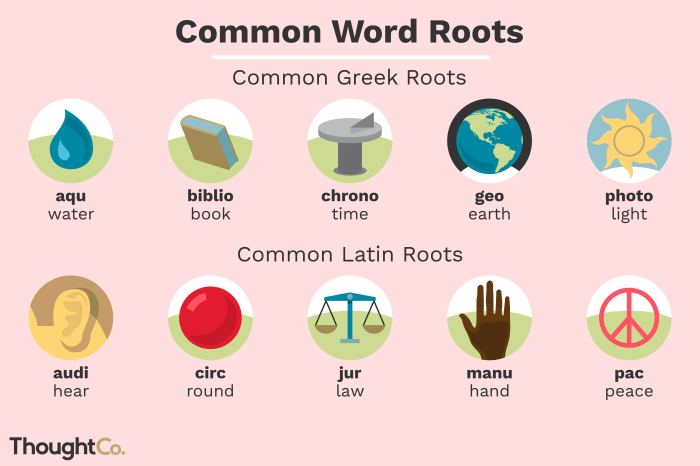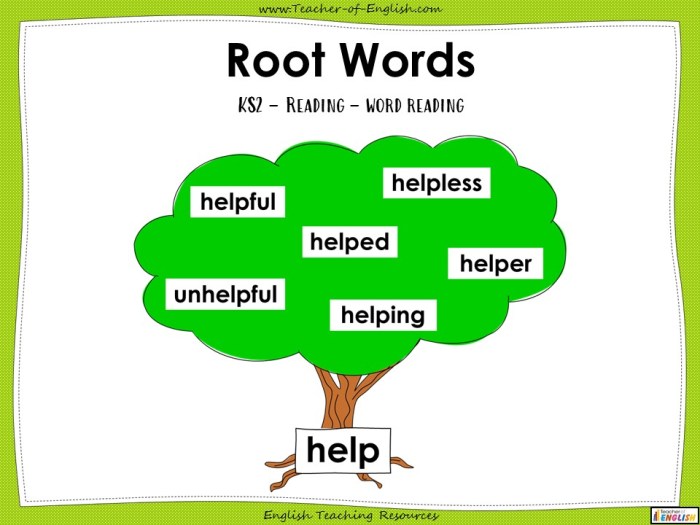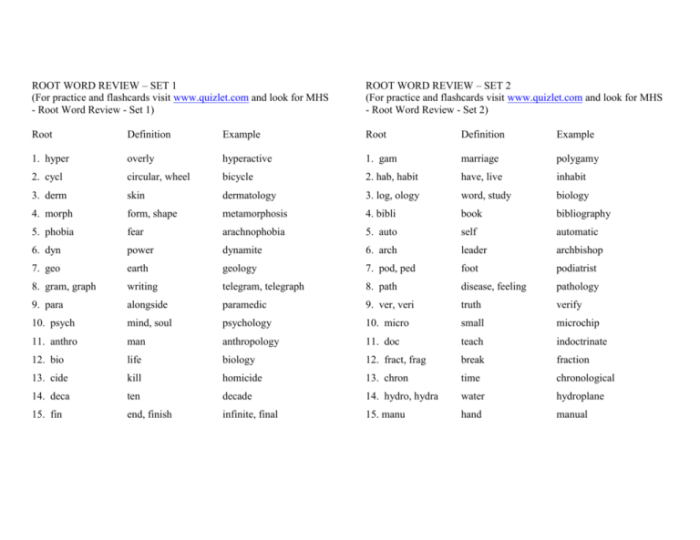Embark on a captivating linguistic journey as we delve into the intriguing world of words with the root word sequ. From its humble Latin origins to its diverse manifestations across languages, sequ weaves a rich tapestry of meaning, connecting concepts of following, succession, and dependence.
Join us as we explore the semantic nuances, morphological variations, and etymological connections of this versatile linguistic element.
Historical Origins of ‘Sequ’

The root word “sequ” originates from the Latin verb “sequi,” which means “to follow.” Over time, “sequ” has evolved in various languages, giving rise to a wide range of words with related meanings.
In ancient Rome, “sequi” was commonly used in military contexts, referring to soldiers following their commander. It also had legal implications, as it denoted the act of pursuing a legal case.
Evolution in Various Languages
The Latin “sequi” has influenced many modern languages, including English, French, Spanish, and Italian. In English, “sequ” appears in words such as “sequence,” “sequel,” and “consequence.” In French, it is found in words like “séquence” and “suite.” In Spanish, “sequ” is present in words such as “secuencia” and “consecuencia.”
Words with the root word sequ, such as “sequel” and “sequence,” often convey the idea of following or continuing. Interestingly, the “bishop of rome crossword clue” bishop of rome crossword clue also relates to this concept, as the bishop of Rome is the leader of the Catholic Church and a successor to the apostles.
Returning to our original topic, words with the root word sequ continue to fascinate with their ability to express ideas of progression and order.
In Italian, it appears in words like “sequenza” and “conseguenza.”
Examples from Different Historical Periods
- Ancient Rome:“sequi” (to follow), “sequor” (I follow)
- Medieval Latin:“sequentia” (sequence), “sequela” (sequel)
- Early Modern English:“sequence” (a series of events), “sequel” (a continuation of a story)
- Modern English:“consequence” (a result of an action), “subsequent” (following after)
Semantic Range of ‘Sequ’

The root word “sequ” carries the core semantic concept of “following” or “coming after.” This fundamental meaning gives rise to various shades of meaning associated with “sequ,” encompassing ideas of order, succession, and dependence.
Order and Succession
Words like “sequence,” “sequential,” and “sequel” highlight the notion of order and succession. A sequence represents an ordered arrangement of elements, while sequential describes something that follows a specific order. A sequel, in turn, refers to a work that follows and continues the story or narrative of an earlier work.
Dependence and Consequence
The semantic range of “sequ” also includes the idea of dependence and consequence. “Consequent” and “consequence” both imply a logical connection between events, where one event follows or results from another. “Subsequent” conveys a similar sense of following or coming after, often emphasizing a causal relationship between events.
Temporal and Spatial Relationships, Words with the root word sequ
In addition to order and dependence, “sequ” can also express temporal and spatial relationships. “Subsequent” and “consequent” can refer to events that occur later in time, while “sequent” can describe something that is located after or behind something else in space.
Morphological Variations of ‘Sequ’
The root word “sequ” undergoes various morphological changes to form different words with distinct meanings and functions in the English language. These variations include the addition of suffixes, prefixes, and root form modifications.
The following table showcases the morphological variations of “sequ” in English:
| Morphological Variation | Suffix/Prefix/Root Form | Example |
|---|---|---|
| Noun | -ence | sequence |
| Verb | -ence | sequence |
| Adjective | -ent | sequent |
| Noun | -el | sequel |
| Verb | -el | sequel |
| Root Form | sequ | sequitur |
The root form “sequ” retains its original meaning of “follow” or “come after” in words like “sequitur,” which is a Latin term meaning “it follows.” The addition of suffixes like “-ence” and “-el” creates nouns and verbs, respectively, that relate to the concept of following or coming after.
For example, “sequence” (noun) refers to a series of events or things that follow one after another, while “sequence” (verb) means to arrange or occur in a particular order.
The suffix “-ent” forms adjectives that describe something as following or coming after, as in the word “sequent,” which means “following in order.”
Etymological Connections of ‘Sequ’

The etymological root “sequ” is shared by several words in English, all related to the concept of following or coming after. These include:
-
-*Sequence
A series of events or items that occur in a specific order.
-*Sequential
Occurring in a specific order or succession.
-*Sequel
A story or event that continues the narrative of a previous one.
-*Consequence
An event or result that follows an action or decision.
-*Subsequent
Coming after something else in time or order.
-*Succession
A series of people or things that follow each other in order.
These words all share the idea of something following or coming after something else, either in a physical or chronological sense. They are all derived from the Latin word “sequi,” which means “to follow.”
Historical and Linguistic Connections
The Latin root “sequ” has been borrowed into many other languages, including French, Spanish, Italian, and Portuguese. In these languages, it is also used to form words related to following or coming after. For example, the French word “suite” means “a series of things that follow each other,” and the Spanish word “consecuencia” means “consequence.”The
root “sequ” is also related to the Greek root “hep,” which means “to follow.” This root is found in words such as “heptad” (a group of seven) and “heptagon” (a seven-sided polygon).These historical and linguistic connections show that the concept of following or coming after is a fundamental one that has been expressed in many different languages throughout history.
Cross-Linguistic Comparisons

The root “sequ” exhibits a fascinating array of cognates in various languages, demonstrating its widespread usage across cultures. These cognates share remarkable semantic and morphological similarities, yet they also exhibit intriguing differences that reflect the unique linguistic evolution of each language.
Cognates and Semantic Similarities
In many Indo-European languages, cognates of “sequ” carry the meaning of “follow” or “come after.” For instance, in Latin, the word “sequor” means “to follow,” while in Greek, “hepomai” conveys the same idea. Similarly, in Sanskrit, the root “sac” means “to accompany” or “to follow.”
Morphological Variations
Despite their shared semantic core, cognates of “sequ” exhibit morphological variations across languages. In English, for example, the root appears as “sequ” (e.g., sequence, sequel), while in Latin, it manifests as “sequ-” (e.g., sequentia, subsequor). In Greek, the root takes the form “hep-” (e.g.,
hepomai, hetera).
Cross-Linguistic Examples
- English:sequence, sequel, consequence
- Latin:sequentia, subsequor, consequentia
- Greek:hepomai, hetera, epetai
- Sanskrit:sac, sacate, saciva
These cross-linguistic comparisons illustrate the widespread presence of the root “sequ” and its cognates, demonstrating the shared etymological origins and semantic connections across diverse languages.
Answers to Common Questions: Words With The Root Word Sequ
What is the origin of the root word sequ?
The root word sequ originates from the Latin verb sequi, meaning “to follow” or “to come after.”
What are some common words that contain the root word sequ?
Some common words that contain the root word sequ include sequence, sequel, consecutive, and prosecute.
How does the root word sequ contribute to the meaning of words?
The root word sequ typically conveys the idea of following, coming after, or being in a series.